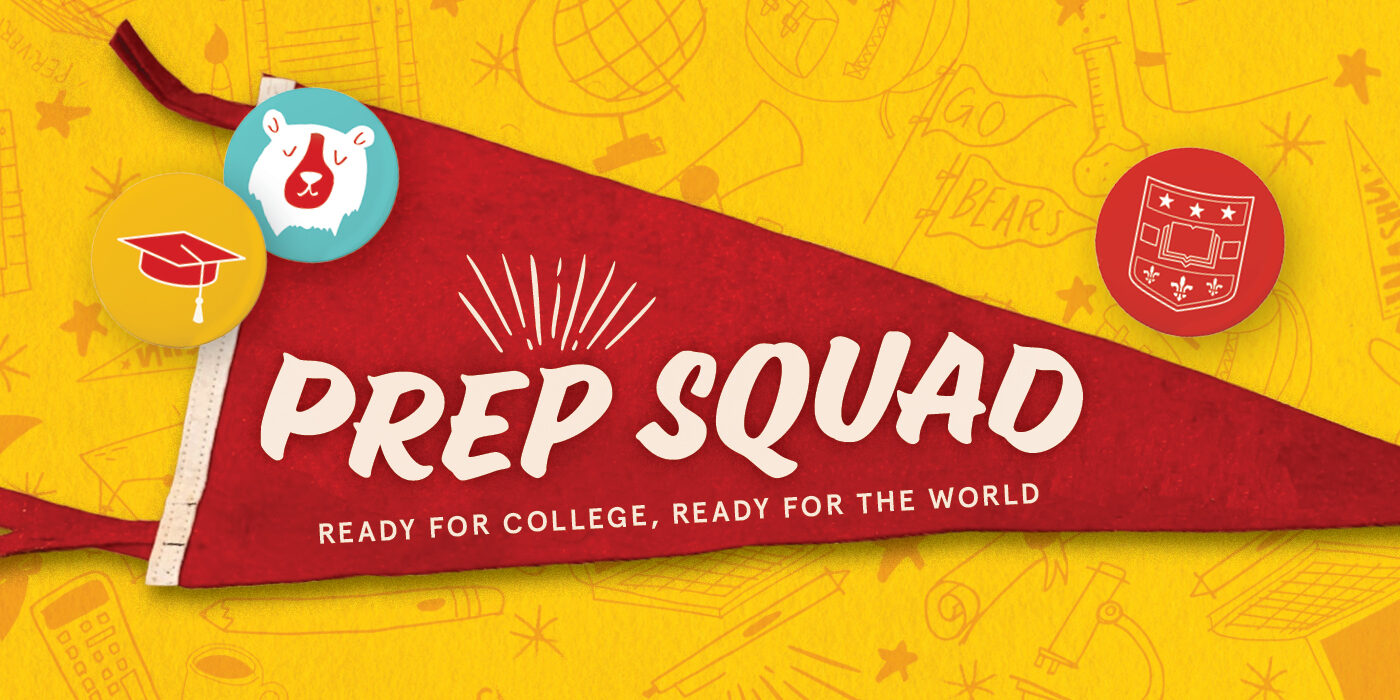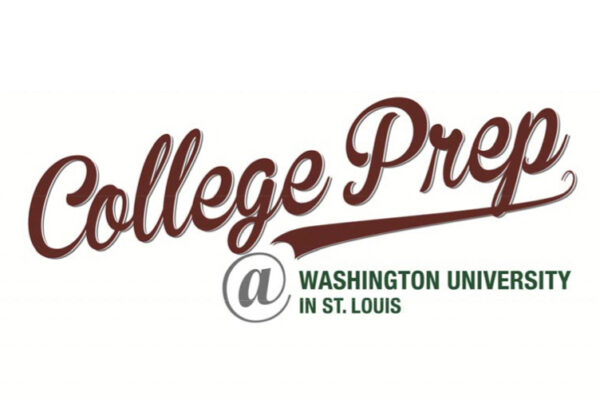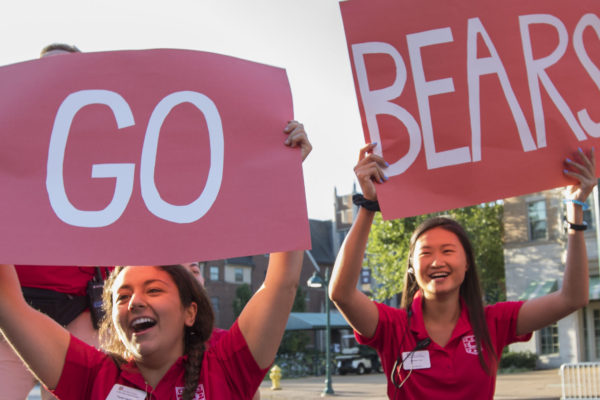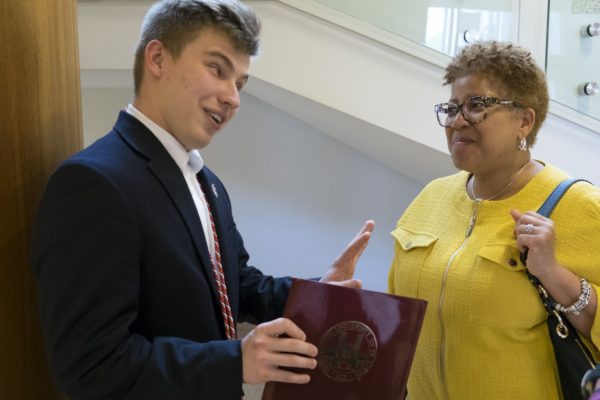Meris Saric was leaning back in his chair at Gateway STEM High School when he started to tumble backward. He reached for the wall, but it was too late.
“As I was falling, I ripped the brochure for the College Prep Program off the bulletin board,” Saric recalls. “My teacher said, ‘Well, I guess you have to apply.’”
Meanwhile, Marquise Butcher, a student at Central Visual and Performing Arts High School, asked his mom to grab his math book from his book bag. Instead she pulled out the same brochure.
“She asked me, ‘Did you read this? Do you realize what an opportunity this is?’” Butcher says.
And across town at Hazelwood West High School, Tabitha Smith learned about the program from her friend. The friend wasn’t interested, but Smith sure was.
“I was like, ‘Dang, this sounds great,’” Smith says.
The year was 2014, and Washington University in St. Louis had just launched the College Prep Program, an innovative effort to help talented first-generation St. Louis students with limited financial resources get to and through college, at no cost to them and their families. Looking back, graduates of the first cohort say the program changed their lives in ways they never imagined, introducing them to new people, new disciplines, new skills and — most of all — new possibilities.
“The College Prep Program opened up my world. I won’t say it made college easy because college is hard. But it did teach me how to take on the challenges and make the most of the opportunities.”
Meris Saric
“The College Prep Program opened up my world,” says Saric, one of six members of the inaugural cohort to graduate from Washington University in May. “I won’t say it made college easy because college is hard. But it did teach me how to take on the challenges and make the most of the opportunities.”
Currently, Washington University accepts 50 rising high school sophomores every year to join the three-year program. But the program started small: 26 students from across the region. Nominated by an educational, civic or religious leader, the accepted students demonstrated a passion for learning and a willingness to work hard. Many had never been away from their parents or visited a college campus when they moved onto the South 40.
“We didn’t know each other or what to expect because we were the first,” Smith recalls. “I think that’s why we became so close so quickly. We accepted each other and we felt accepted.”
For three summers, the students lived in South 40 residence halls and took classes for college credit from Washington University professors. They dissected a sheep’s brain in a biology lab, built prototypes in a design thinking seminar and wrote essays about great collaborations in science and music history. They also attended spoken word performances, practiced yoga and stayed up late in the residence halls, engaging in the kinds of conversations and debates that can make college so transformative.
By living the life of a college student, they mastered important skills: how to manage their time, communicate with faculty and leverage resources commonly found on college campuses like writing centers and subject libraries. They also discovered more about themselves: how to build strong relationships with people of different backgrounds and beliefs, explore new career interests and care for their mental and physical health.
The learning continued throughout the school year, too. Students reunited on campus to prep for the ACT, perfect their college essays and complete their financial aid forms.
Along the way, they were supported by graduate fellows, most of whom were Brown School students, and met experts from essential campus departments, including Student Financial Services, the Habif Health and Wellness Center, University Libraries, the Career Center, Office of the Provost and the Division of Student Affairs.
“Our vision from the start was to support the whole student throughout their high school careers,” says Courtney E. Brewster, director of the College Prep Program. “And we’ve done that. With the help of our campus partners, we have created a welcoming community of scholars — a place where students are supported and inspired, not just challenged academically.”
The program was initiated by then-Chancellor Mark S. Wrighton, who wanted to help address the yawning disparities in college completion in the St. Louis region. Currently, about 36% of the region’s adults hold a degree, better than the national average of 32%. But a closer look reveals only 16% of the lowest-income students complete a degree compared with 62% of those from the wealthiest families. The hurdles are many, and no program can dismantle them all. But Brewster and Leah Merrifield, the program’s now-retired founding director, knew students could learn the skills needed to overcome these obstacles.
“By providing comprehensive support and resources over a sustained period of time, we’ve been able to help students in our own backyard achieve their goals.”
Courtney Brewster, Director, College Prep
“By providing comprehensive support and resources over a sustained period of time, we’ve been able to help students in our own backyard achieve their goals,” Brewster says. “This work benefits not only the scholars; it also serves their families and communities. The College Prep Program is truly an example of Washington University being ‘in St. Louis, for St. Louis.’”
So far, 173 student–scholars have graduated from the program. Most are currently in college, including 28 who continued their educations at Washington University through the new WashU Pledge, which provides a free undergraduate education to admitted students from Missouri and Southern Illinois whose families make less than $75,000 a year. Previously admitted scholars attended Washington University through the College Prep Scholarship.
Still, the transition from College Prep Scholar to Washington University first-year student wasn’t always easy, says Mackenzie Hines-Wilson, who graduated with a degree in philosophy-neuroscience-psychology. She says she felt isolated in her large pre-med classes until she found her people.
“Here I was with all of these really smart students who didn’t look like me,” Hines-Wilson says. “The impostor syndrome started to take over. But College Prep taught me the importance of surrounding myself with people who understand me and support me. That made a big difference.”
For Saric, academics were a struggle, especially his introductory classics course taught by Grizelda McClelland, assistant dean in Arts & Sciences. He knew the university offered peer tutoring through the Center for Teaching and Learning and Deneb STARS, a cohort program for low-income and first-generation students. Still, he resisted.
“I wanted to present myself as someone who could do it by himself,” says Saric, who majored in political science. “But Dean McClelland stressed that I couldn’t be afraid to ask for help when I needed it. I didn’t get an A in her class, but I was proud of my grade. And I re-learned the No. 1 thing the College Prep Program taught us: Ask for help.”
Emanuel Barcenas also suffered a crisis of confidence when he realized medical school was not for him. Like many College Prep alums, he turned to Brewster, a.k.a. Ms. Courtney,
for advice.
“It took a while to figure out the right path, and Ms. Courtney really helped me with that process,” says Barcenas, who plans to attend law school. “We already had that bond, so she knew the person I was and the person I wanted to become.”
Many College Prep graduates return to the program as staff, developing programs, speaking at panels and wrangling young scholars as they move from activity to activity. It’s harder work than many expect (“It’s scary when you count all your kids, and you’re one short because someone went to the bathroom without telling you,” Smith says.), but also rewarding. Hines-Wilson served as program assistant for three years, tutoring a scholar in pre-calculus, leading educational programs and organizing an event about mental health and mindfulness.
“As a scholar, it was so nice to have a community that wanted to see me succeed and had faith in me,” Hines-Wilson says. “The program is like a family, and like all good families we want the best for each other — no matter what comes next.”
Emanuel Barcenas
Finance | Olin Business School
Emanuel Barcenas switched majors four times at Washington University, but he never changed his dream: to serve undocumented families like his own.
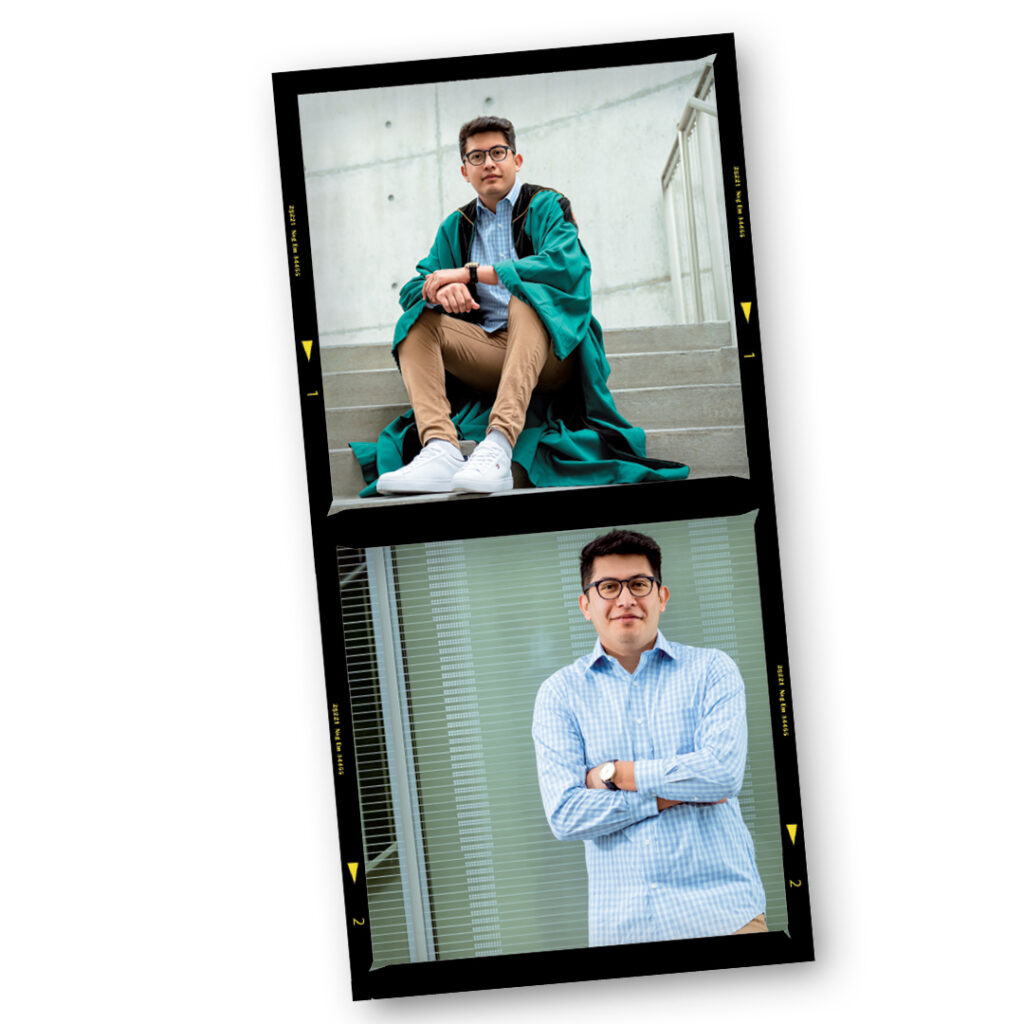
“I know firsthand all the obstacles families face,” says Barcenas, a Rodriguez Scholar. “My time at WashU helped me discover how I can make the biggest impact to help my community.”
Barcenas’ family immigrated to St. Louis from Mexico when Barcenas was 5. A decade later, his
father traveled to Mexico to care for his dying mother. Barcenas has not seen him since.
“He can’t come back here, and I can’t go there,” says Barcenas, who is protected from deportation by the Deferred Action for Childhood Arrivals (DACA) policy. “There are no good solutions. It’s been difficult for all of us.”
After studying philosophy-neurosciencepsychology, then psychology, then political science, Barcenas transferred to Olin Business School, earning a degree in finance. He now lives in Madison, Wisconsin, where he works at Epic, a medical software company.
Ultimately, Barcenas plans to attend law school and start a nonprofit like the Migrant and Immigrant Community Action Project (MICA Project), where he interned as an undergraduate. There he supported the organization’s efforts to provide legal assistance, host education programs and advocate for immigrant and refugee rights.
“Their attorneys are making such a big impact,” Barcenas says. “You can’t navigate the immigration process alone; you need attorneys who truly care about the community. I can be that resource.”
Mackenzie Hines-Wilson
Philosophy-Neuroscience-Psychology | Arts & Sciences
Mackenzie Hines-Wilson arrived at WashU with the compassion and curiosity required to be a good clinician. She left with the skills and experience to be a great researcher as well.
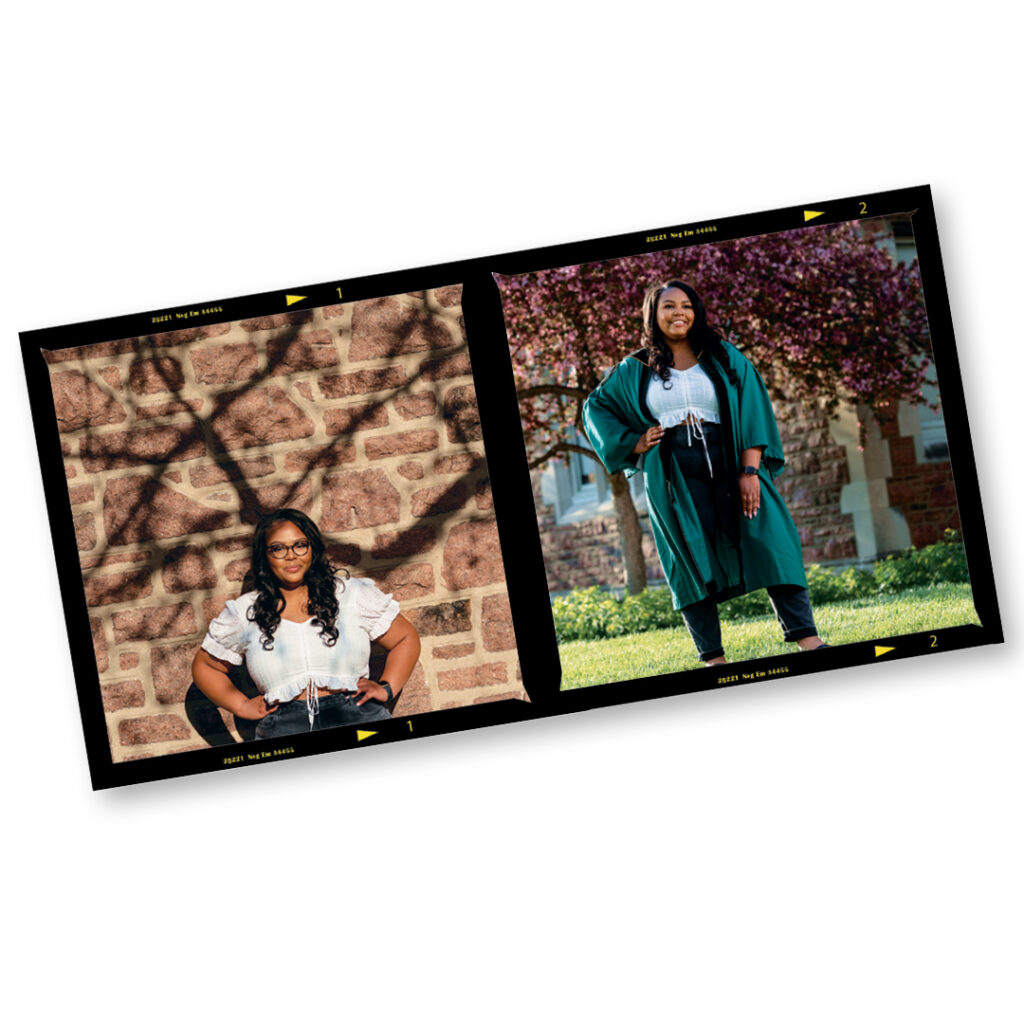
As an undergraduate, Hines-Wilson assisted a number of university researchers, including Chelsey Carter, MA ’17, PhD ’21 (anthropology), MPH ’21, who is studying Black people with neuromuscular diseases like amyotrophic lateral sclerosis (ALS); and Lori Markson, associate professor of psychological and brain sciences, who is investigating how children think, reason and learn. In addition, Hines-Wilson participated in the Institute for Public Health summer research program in aging and neurological diseases, and shadowed Eric J. Lenze, MD, the Wallace and Lucille K. Renard Professor of Psychiatry and an expert in geriatric psychiatry.
Those experiences led her to the Marcus Autism Center at Emory University School of Medicine where she is conducting research and gaining clinical experience as the Donald J. Cohen Developmental Social Neuroscience Fellow. Ultimately, Hines-Wilson plans to earn an MD/Master of Public Health in psychiatry or neuroscience.
“WashU gave me the chance to explore all my passions and to discover new interests,” says Hines-Wilson, who was both a Civic and an Ervin Scholar. “I’ve learned so much about the pediatric and geriatric populations. They are so different, but they’re both experiencing transformative periods of life.”
Hines-Wilson also was a lead coordinator for S.A.R.A.H. (Sexual Assault and Rape Anonymous Helpline) and a residential advisor, helping sophomores navigate what she calls “the forgotten year.”
“Those experiences taught me a lot, such as how to be an active listener and how to validate the other person’s experiences,” Hines-Wilson says. “Those are transferable skills I’ll use for the rest of my life.”
Denye Mickens
Sociology | Arts & Sciences
After the death of a beloved aunt to sudden cardiac arrest, Denye Mickens decided she would be a heart doctor. Still in high school, Mickens joined the lab of Jeanne M. Nerbonne, professor of medicine, studying the relationship between proteins and cardiac function. The research fascinated Mickens as did her pre-med classes in molecular biology and neuroscience.
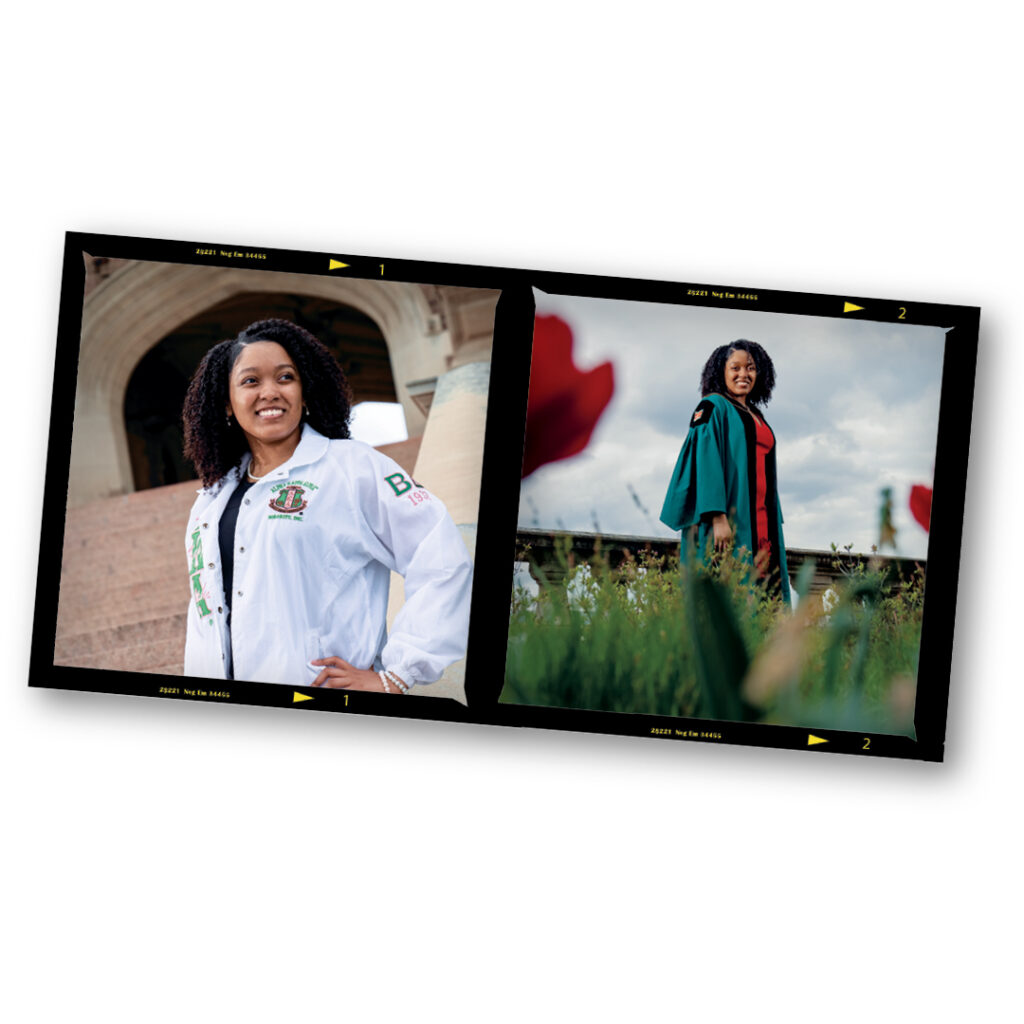
But they didn’t fully answer the question that had haunted her for years: Why had so many loved ones succumbed to illness and disease?
“I started to realize the answers go beyond proteins and basic biology and science,” Mickens says. “Health outcomes also are a result of inequities. Race, economic status, where someone lives — all those things play a role in a way I didn’t fully understand.”
Mickens changed her major to sociology. “If it seems like sociology and medicine don’t go together, I promise you, they do,” Mickens says. She then joined the Washington University Neonatal Development Research (WUNDER) Lab, which investigates early brain development, including the social and environmental factors that may cause developmental delays. Mickens still plans to attend medical school, but she also wants to earn a master’s degree in public health.
“It’s been wonderful to have these two different types of research,” says Mickens, who was also a member of the Ervin Scholars Program, a residential advisor and the student speaker at the 2020 virtual Convocation ceremony. “Both are important but, for me, public health research is really fulfilling. The COVID-19 pandemic has made it all too clear that good public health practices and policies are vital for our nation and our world.”
Jaliece Rivers
Marketing | Olin Business School
With the world still recovering from the COVID-19 pandemic, now may not be the right time to pursue a career in event planning. Or maybe, says Jaliece Rivers, it’s the perfect time.
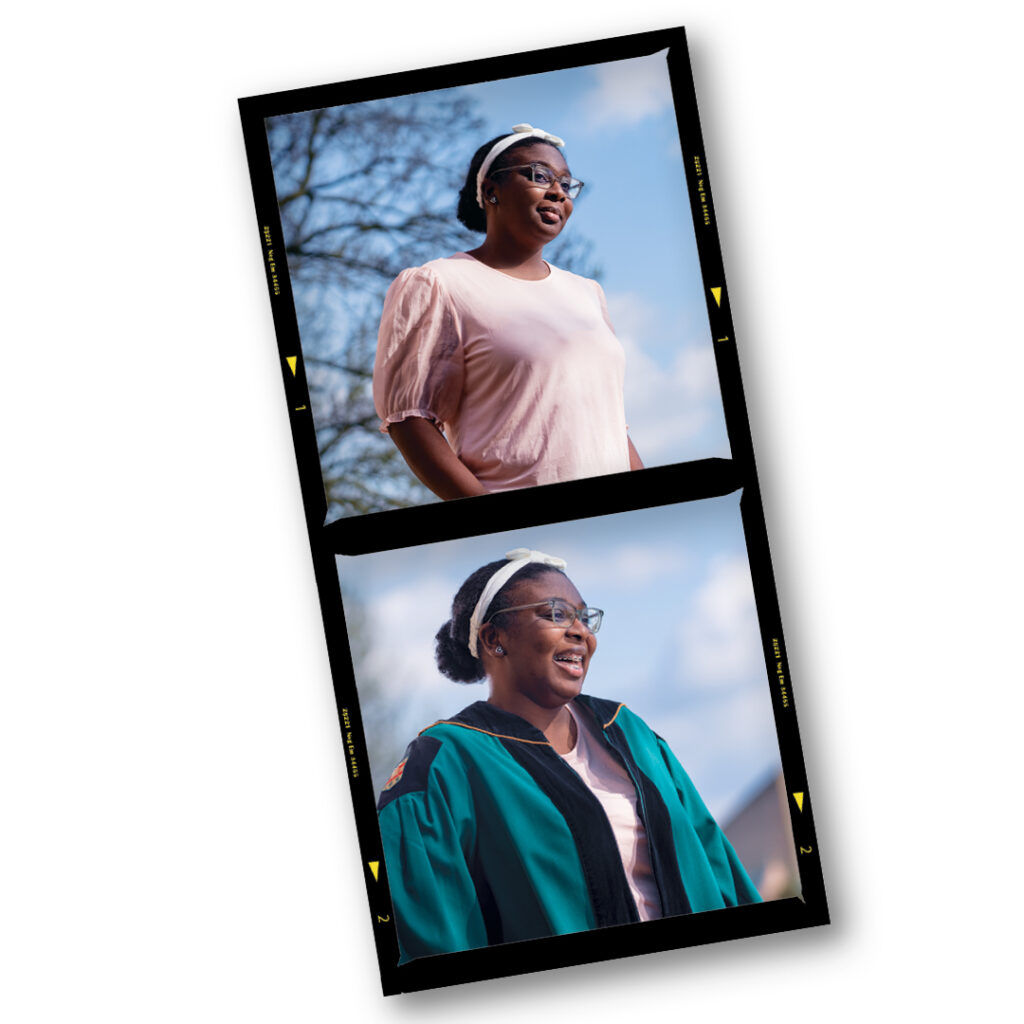
“The past year has been so hard for so many reasons, but we all realized how important it is to be together,” says Rivers, who earned a degree in marketing from Olin Business School. “The industry was definitely hit hard, but it will come back stronger because we’re all feeling that need for community. No pandemic can ever change that.”
Rivers has been bringing people together since she arrived on campus. As the first-ever vice president of events for the Olin Business Council, Rivers organized a trip to Chicago for students to network with marketing professionals. Rivers also served as programming manager for Ursa’s, expanding its programming to reach more upper-level students who live off campus and in the Village. In addition, Rivers was among the many College Prep alumni who returned to the program as an assistant.
“A lot of our job was making sure everyone followed directions and that nobody got lost,” says Rivers with a laugh. “But my favorite part was making sure everyone felt comfortable and welcome — in other words, hospitality. That’s what I’m all about.”
Meris Saric
Political Science | Arts & Sciences
One day, Meris Saric will serve the United States as a foreign service officer.
But today, he is serving his adopted nation as a Teach For America third-grade teacher in
Washington, D.C.
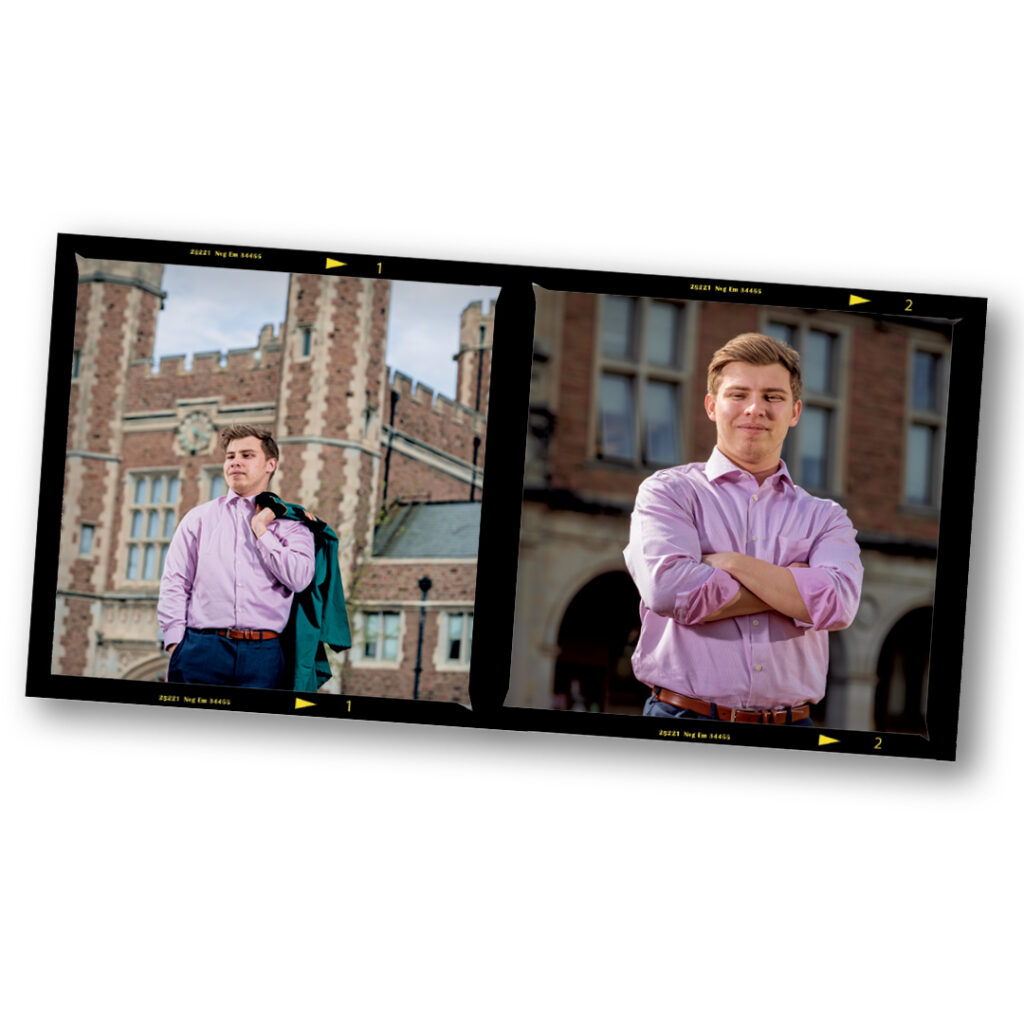
“Third grade is that pivotal year when students transition from learning to read to reading to learn,” says Saric, himself a product of TFA teachers. “I can think of no better way to start my career in public service than being a force for good for these children. This is my way of paying forward all that I have received from my teachers, my professors and everyone at the College Prep Program.”
Born in Bosnia in the aftermath of a devastating war, Saric eventually plans to attend graduate school and work for the U.S. State Department. He has studied American foreign policy as a political science major in Arts & Sciences, interned at the Advisory Council for Bosnia and Herzegovina, volunteered as a poll worker and campaigned for Democratic political candidates.
“I know firsthand the power of diplomacy,” Saric says. “As Americans, we don’t always fully appreciate it, but we have such an important role in the world.”
In addition, Saric also worked as a student conduct ambassador, creating programs to raise awareness about academic integrity. He saw the sensitive work as early training for his career in government.
“In a way, it put me in the mindset of someone who works with classified information,”
Saric says. “Student conduct may sound like a bunch of rules and punishments, but our work was about creating a culture that is fair. That’s what we all want.”
Tabitha Smith
Psychology | Arts & Sciences
Tabitha Smith imagined college life would be a whirlwind of exciting classes, interesting friends and weekends packed with parties.
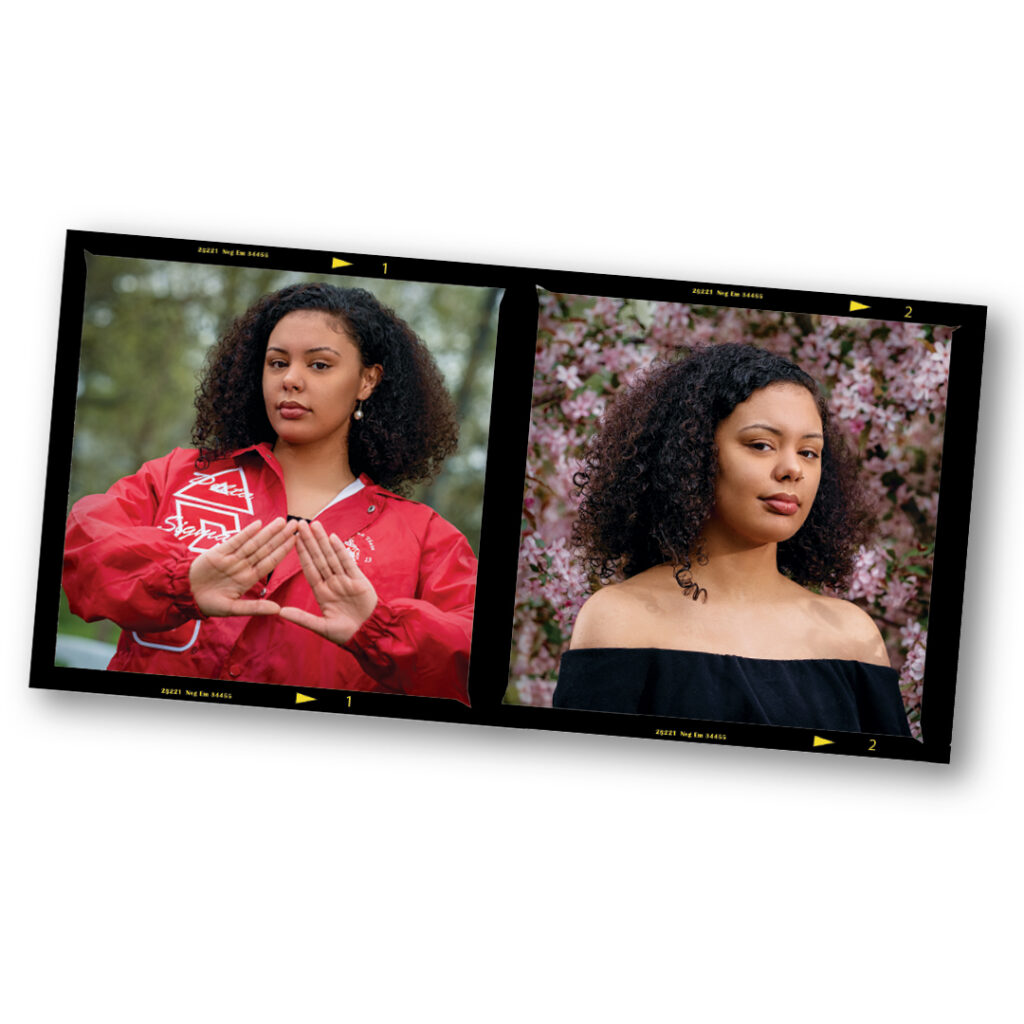
And it was — for a while. She joined the campus mariachi band and met fascinating students and professors from across the globe. But when both of her grandparents fell ill, Smith stepped up to help provide around-the-clock care. Smith’s professors were accommodating, extending deadlines and excusing absences. Still, she was exhausted.
“There were many nights when I asked: ‘How am I supposed to care about my homework? I just had to convince my grandmother that I’m really her granddaughter and that I didn’t break into the house,’” says Smith, whose grandparents have since passed away. “I grew up really fast.”
During this time, Smith’s 4-year-old brother was diagnosed with autism. Some family members confused his behaviors with obstinance, but Smith recognized that he needed treatment. The more she learned about the developmental disorder, the more she wanted to help people with disabilities. She started work at Easter Seals, providing applied behavioral analysis (ABA) therapy to young children.
“I really enjoy helping children build social skills and reinforcing positive behaviors,” Smith says.
Smith is considering a career in disability services, or she may seek out research opportunities in a psychology lab. But right now, she is taking a moment to breathe.
“I’ve got my apartment, I’ve got friendships,” Smith says. “I’m not going to pressure myself to find that perfect career. I just want a job that I enjoy.”
